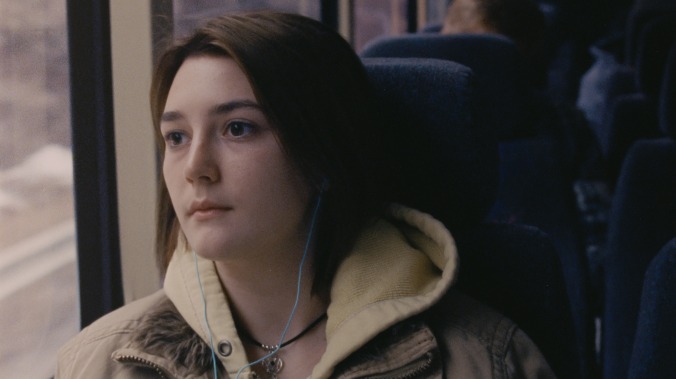The powerful Never Rarely Sometimes Always puts a human face on the right to choose


Every woman has an abortion story—if not her own, then that of someone she knows. If you’re lucky, it’s relatively mundane, a story about a minor medical procedure obtained safely and affordably. But the fact of the matter is, whether due to geography, economics, age, or cultural barriers, freedom of choice is not the same for everyone in America. In many places, there’s not much difference between now and the pre-Roe V. Wade era, as director Eliza Hittman subtly but sardonically notes in an opening sequence of a high school talent show with a ’50s theme. And so there are traumatic stories, too, about teenagers throwing themselves down flights of stairs or college students getting blackout drunk every night in hopes that it will induce a miscarriage. Never Rarely Sometimes Always acknowledges both of these extremes, but doesn’t live in either of them.
Its protagonist, 17-year-old aspiring musician Autumn (Sidney Flanigan), is afraid to tell her parents she’s pregnant, and her abusive ex-boyfriend is no help either. But she can rely on her cousin, Skylar (Talia Ryder), for support, even if she sometimes rejects it. Autumn punches herself in the stomach until it leaves deep bruises in a desperate attempt to self-induce, but eventually makes it to a Planned Parenthood office where she’s able to meet with sympathetic doctors and social workers. Autumn and Skylar’s journey to that office makes up the majority of this film, which digs into the truth of abortion access in America today without rupturing the delicate humanity behind this politically charged issue. If the film were to be seen as taking sides, that’s only because it portrays Planned Parenthood in a positive light. But it also resists demonizing the “crisis pregnancy center” that Autumn visits early in the film, even though it’s of no help for the silent but firm (and significantly unquestioned) decision she makes early on that she’s not ready to have a child.
Autumn and Skylar barely have enough money for bus fare from their small Rust Belt Pennsylvania town to New York City, and spend the two nights that pass before Autumn’s procedure is complete hanging out in bus stations and riding the subway to nowhere in particular. In many films, this situation would lead to a shocking point of no return a lá Larry Clark’s Kids (1995). But Hittman isn’t that type of filmmaker. She’s more interested in conveying reality than manufacturing drama, a quality that proved stultifying in her previous feature, Beach Rats (2017). Here, however, the minimal dialogue and all that passes unspoken between Autumn and Skylar—Autumn never uses the word “pregnant,” Skyler just knows after her cousin runs from the cash register at their supermarket job to vomit—conveys a touching sense of intimacy between the girls.
Hittman reinforces this intimacy with small moments of Autumn and Skylar helping each other, many of them involving the bulky suitcase they bring to NYC that thuds across the uneven pavement as the metaphorical manifestation of their burden. Shots of hands—theirs touching, other peoples’ touching them—similarly, wordlessly convey their shared anxiety, as well as the ambient threat posed by men in general both in their small town and the big city. Autumn’s withdrawn stoicism is a survival mechanism, developed in response to some very real dangers.
Although the film takes its time getting there, all this is made clear in the extended, heartbreaking interview scene that gives Never Rarely Sometimes Always its title. Asked by a counselor to answer questions about domestic violence and sexual coercion with one of those words, Flanigan squirms in her seat in an unbroken medium shot, her eyes darting everywhere but toward the woman addressing her. The most she can squeeze out for some of the questions is a breathy “yeah,” and others she can’t answer at all. This scene gives new context to her situation, while also subtly reinforcing her toughness—and, indeed, that of every woman and girl. Abortion stories are real, and they take place every day, often so quietly that no one but those closest to the people involved even know they’re happening. The power of Hittman’s film lies in that combination of ordinary suffering and extraordinary strength.